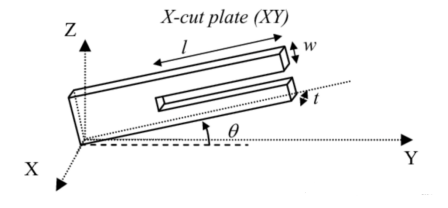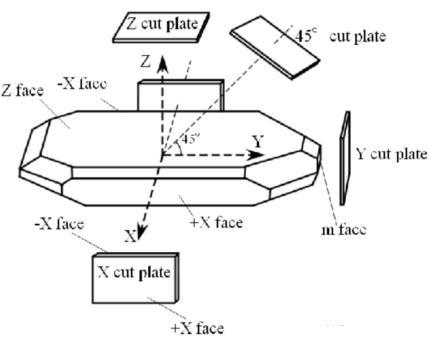Quartz crystal oscillators utilize high-quality piezoelectric crystals, harnessing the piezoelectric effect to generate stable oscillations. The crystal's quality factor (Q) directly impacts frequency stability—a higher Q provides a more accurate and reliable clock signal. The vibration frequency characteristics are determined by three key factors: crystal thickness, crystal geometry, and cutting method.
The frequency of a quartz crystal is inversely proportional to the thickness of the crystal:
Thin wafers: Support higher oscillation frequencies, ideal for high-frequency applications.
Thick wafers: small vibration amplitude and excellent resistance to mechanical shock
Technological breakthrough : Overtone crystal technology enables a chip with a fundamental frequency of 20MHz to reach 100MHz through the fifth overtone, allowing medium and low fundamental frequency chips to meet high-frequency requirements of hundreds of megahertz.
Typical application: 32.768kHz crystal oscillator
Typical dimensions: 3.2 × 1.5 × 0.8 mm
Temperature characteristics: parabolic characteristics of -0.04ppm/℃²
Manufacturing process: Photolithography technology is used to achieve micron-level precision
Frequency determining factors: mainly depends on the fork length (L), the longer the length, the higher the frequency
Advantages: Especially suitable for low-frequency precise timing scenarios

Frequency range: MHz level application
Miniaturization: From 7.0×5.0mm to 1.6×1.2mm
High frequency: Up to 300MHz through chamfered edge technology
Low power consumption: current consumption can be as low as 0.5μA
Main features: convenient for large-scale production and standardized packaging
Frequency Determinants: Thickness is the Main Influencing Factor

The cutting angle of the quartz crystal (defined in the XYZ coordinate system) directly affects:
(1) Long-term aging characteristics
(2) Temperature stability
(3) Frequency accuracy
Mainstream cutting methods : AT cutting, BT cutting, SC cutting, IT cutting, and special cutting processes designed specifically for tuning fork wafers. Each method has its own performance advantages and applicable scenarios.
Contact
Need the optimal quartz crystal oscillator solution for your application? Our team of engineers can provide complete crystal oscillator selection recommendations and technical support, from low to high frequencies, based on your specific application needs.
Please contact our sales team:
Tel: 0086-576-89808609
Email: market@acrystals.com